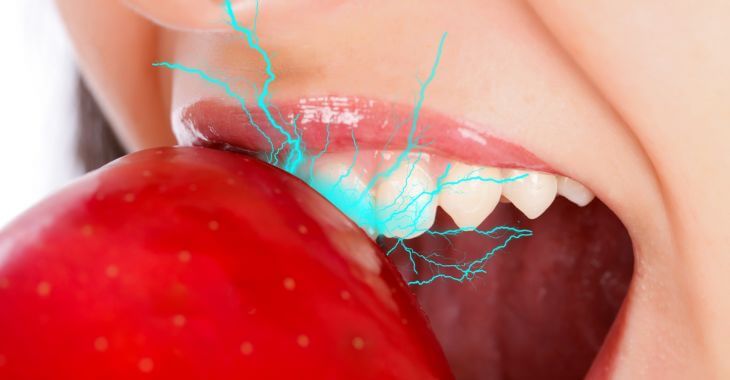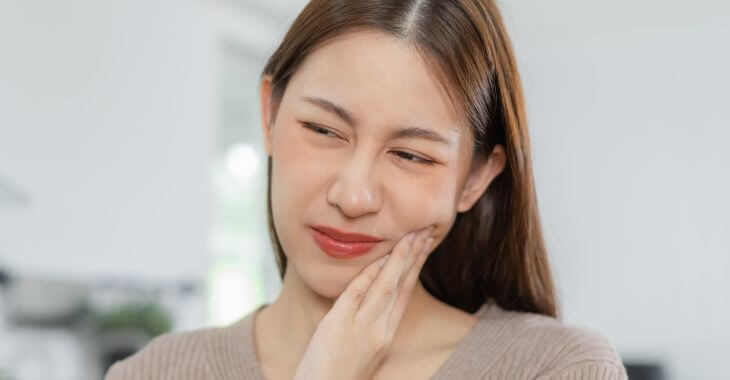Why Does My Teeth Hurt When I Bite Down?

Biting down should be painless and straightforward, yet for some, it is accompanied by discomfort or even sharp pain. If you find yourself wincing every time you bite down, you are not alone. If you wonder, “Why does my teeth hurt when I bite down?” it is likely a dental problem.
Understanding the reasons behind this dental dilemma is crucial for finding relief and maintaining optimal oral health. There are multiple reasons one or more teeth may hurt when biting down, many involving dental issues.
The Mechanics of Biting and Causes Of Tooth Pain
When you bite down, your teeth come together, applying pressure to food for chewing and breaking it down into smaller, digestible pieces. This process relies on the alignment and integrity of your teeth, jaw joints, and surrounding tissues. If you experience pain, it may be due to one of the following:
Dental Fractures
If you think, “One tooth hurts when I bite down – why?” you may have a tooth fracture. These can occur due to trauma, habitual teeth grinding (bruxism) or even biting down on hard objects like ice or popcorn kernels. A fractured tooth can cause sharp pain upon biting down, especially with deep fractures.
Tooth Decay
Decay, also known as cavities, weakens the tooth structure, making it more susceptible to pain and sensitivity. When decay reaches the inner layers of the tooth, it can cause discomfort when pressure is applied during biting. Deep cavities can lead to inflammation or infection of the tooth pulp.
Gum Disease
Gum disease, characterized by inflammation and infection of the gum tissues, can cause gum recession and expose the sensitive roots of teeth. When roots become exposed, biting down can trigger discomfort or pain, especially if the roots are affected by decay or sensitivity.
Dental Abscess
An abscessed tooth, marked by a bacterial infection in the tooth root or surrounding tissues, can elicit intense pain when pressure is applied. The pain may radiate beyond the affected tooth and worsen with biting or chewing. In severe cases, abscesses can lead to swelling, fever, and systemic complications if left untreated.
Misaligned Teeth
Why do my back teeth hurt when I bite down? Teeth that are misaligned or crooked can create uneven pressure distribution when biting down, leading to localized discomfort or pain, especially on the back teeth. Uneven stress can exacerbate existing dental issues and contribute to jaw and teeth pain.
Diagnosis and Treatment
If you are experiencing tooth pain when biting down, prompt evaluation by a dentist is essential to identify the underlying cause and initiate appropriate treatment. Your dentist will perform a comprehensive examination to assess the condition of your teeth, gums, and supporting structures.
X-rays and other diagnostic tools can help identify the dental issue resulting in pain. Once the cause of tooth pain when biting down is determined, a treatment plan can be recommended. Treatment options for tooth pain during biting vary depending on the underlying cause but may include:
- Dental fillings, dental crowns or other restorations to repair cavities or fractures.
- Root canal therapy to remove infected or inflamed pulp tissue.
- Gum disease treatment, such as deep cleaning (scaling and root planing) or periodontal surgery.
- Antibiotics or drainage procedures for dental abscesses.
- Orthodontic treatment to correct misaligned teeth and improve bite alignment.
Depending on the cause of the tooth pain and whether one or more teeth are involved, your dentist may recommend a combination of treatments to obtain optimum oral health.
Preventive Strategies
Prevention is always preferable to treatment when it comes to dental issues. Incorporating the following preventive strategies can help safeguard your oral health and minimize the risk of tooth pain while biting down:
- Maintain Good Oral Hygiene: Brushing twice a day, flossing daily, and using antimicrobial mouthwash can help remove plaque and bacteria that contribute to tooth decay and gum disease.
- Wear a Mouthguard: If you’re prone to teeth grinding or clenching, wearing a custom-fitted mouthguard can protect your teeth from excessive wear and reduce the risk of fractures or sensitivity.
- Avoid Hard Foods and Objects: Steer clear of hard candies, ice cubes, and other hard objects that can damage your teeth and lead to fractures or trauma.
- Attend Regular Dental Checkups: Routine dental visits allow your dentist to detect and address dental issues early before they escalate into more significant problems.
Experiencing tooth pain when biting down is a sign that something is not quite right with your oral health. By understanding the potential causes and adopting preventive measures, you can bite down with confidence and enjoy a pain-free oral experience.

Whether it is due to dental fractures, decay, gum disease or misalignment, seeking timely evaluation and treatment from a dentist is paramount for alleviating discomfort and preserving your smile. If you experience tooth pain when biting down, contact a dentist for an appointment.
The information provided on this website, including text, graphics, images, and other materials, is intended solely for informational purposes and should not be used as a substitute for professional medical advice, diagnosis, or treatment.




)